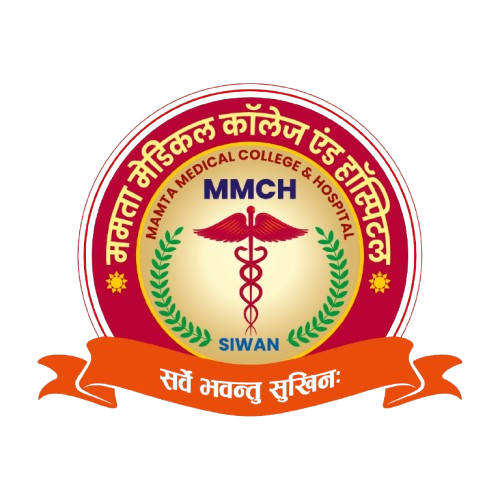
🕵️♂️ Department of Forensic Medicine & Toxicology
Mamta Medical College & Hospital, Siwan (MMCH)
The Department of Forensic Medicine & Toxicology at Mamta Medical College & Hospital, Siwan, is a vital component of the undergraduate MBBS curriculum. It is committed to providing comprehensive training in the application of medical knowledge to legal issues, medico-legal ethics, and toxicology. The department plays a crucial role in bridging the gap between medicine and law, ensuring that future doctors are well-equipped to serve both clinical responsibilities and medico-legal duties.
At MMCH, we believe that medical graduates must not only be skilled clinicians but also responsible citizens who understand their ethical, social, and legal obligations. Our department offers a well-structured academic curriculum, practical exposure, and expert guidance in Forensic Medicine, Legal Procedures, Postmortem Techniques, and Clinical Toxicology. The goal is to train students to handle medico-legal cases with professionalism, compassion, and scientific accuracy.
🧠 What is Forensic Medicine & Toxicology?
Forensic Medicine (also known as Legal Medicine) is the branch of medicine that applies medical knowledge to the service of law and justice. It involves the investigation of deaths, injuries, and other conditions where medical issues intersect with legal considerations.
Toxicology is the scientific study of poisons, including their sources, effects on the body, clinical symptoms, diagnosis, treatment, and legal implications.
Key areas of focus:
Medico-legal autopsies
Assessment of injuries and wounds
Age estimation
Medical jurisprudence and ethics
Identification of deceased individuals
Clinical and forensic toxicology
Alcohol and drug-related cases
Sexual offense examination and reporting
🏥 Infrastructure & Facilities
The Department of Forensic Medicine & Toxicology at MMCH Siwan is equipped with all essential academic and practical facilities to ensure effective teaching and medico-legal services.
🔹 Facilities include:
Well-ventilated Dissection and Autopsy Hall with modern instruments
Forensic Museum housing over 100 models, weapons, photographs, and specimens
Demonstration Rooms with multimedia teaching aids
Moot Court Setup for medico-legal simulations
Toxicology Lab for analysis and identification of poisons
Mortuary with Autopsy Facility in collaboration with the hospital
Display of case records, X-rays, toxicological specimens, and medico-legal charts
Separate Faculty Rooms and a Seminar Hall for interactive learning
📘 Curriculum Overview
The teaching of Forensic Medicine & Toxicology follows the Competency-Based Medical Education (CBME) pattern set by the National Medical Commission (NMC). It is primarily taught during the 3rd to 5th semesters (Second MBBS).
Core Modules Include:
Introduction to Forensic Medicine
Legal Procedures & Medico-legal Documentation
Identification: Race, Age, Sex, and Individual Identity
Thanatology: Death and Changes After Death
Medico-legal Autopsy: Objectives, Technique, and Reporting
Injuries: Mechanical, Firearm, Thermal, Transportation-related
Sexual Offences and Infanticide
Medical Ethics and the Code of Conduct
Forensic Psychiatry
Toxicology: Plant poisons, Drug overdoses, Alcohol, Corrosives, Gases, etc.
Role of Doctors in Legal Proceedings and Courtroom Testimony
⚖️ Practical Exposure
Practical training is a key highlight of our department, where students actively participate in medico-legal services in a supervised and structured environment.
Hands-on Skills Taught:
Observation and participation in Postmortem Examinations
Preparing Injury Certificates and Medico-Legal Reports (MLRs)
Age estimation using radiographs, dentition, and physical markers
Assessment and documentation of sexual assault cases
Identification of common poisons and symptoms of poisoning
Learning procedures for sample collection in toxicological and forensic investigations
Exposure to case-based learning with actual medico-legal cases handled by the hospital
🧪 Toxicology & Poison Management
Toxicology is an integral part of this department, and students are trained in the identification, clinical features, diagnosis, and management of poisoning cases.
Common Topics in Toxicology:
Corrosive Poisoning (acids, alkalis)
Metallic Poisons (arsenic, lead, mercury)
Plant Poisons (dhatura, oleander, cannabis)
Snake Bite and Scorpion Sting
Drug Overdose (barbiturates, opioids, benzodiazepines)
Alcohol and Organophosphate Poisoning
Food Poisoning and Household Toxins
Management of Poisoning and Legal Responsibilities
Students learn about first aid, gastric lavage, use of antidotes, and medico-legal implications in poisoning cases.
🌐 Vision & Mission
Vision:
To cultivate excellence in medico-legal education, forensic diagnostics, and ethical practice, creating doctors who uphold justice, ethics, and scientific integrity.
Mission:
Provide students with strong foundational knowledge and practical skills
Promote ethical and legal literacy among medical graduates
Support judicial proceedings through expert medical input
Collaborate with law enforcement and legal authorities
Strengthen medico-legal education and awareness in rural Bihar
